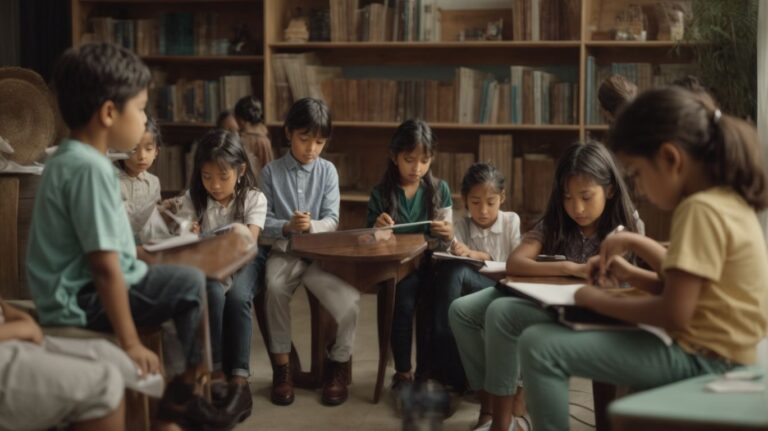Child psychology is a fascinating field that involves understanding and working with the mental, emotional, and behavioral development of children. But what does it take to become a child psychologist? From educational requirements to licensure and job duties, there are several key steps and skills to consider.
In this article, we’ll explore the educational path to becoming a child psychologist, the licensure requirements, the necessary skills and qualities, as well as the job duties and the salary and job outlook in this rewarding career.
Whether you’re considering a career in child psychology or simply want to learn more about this field, read on to discover what it takes to become a successful child psychologist.
Contents
- 1 Key Takeaways:
- 2 What Is A Child Psychologist?
- 3 What Are The Educational Requirements To Become A Child Psychologist?
- 4 What Are The Licensure Requirements For Child Psychologists?
- 5 What Skills And Qualities Are Needed To Be A Successful Child Psychologist?
- 6 What Are The Job Duties Of A Child Psychologist?
- 7 What Is The Salary And Job Outlook For Child Psychologists?
- 8 Frequently Asked Questions
- 8.1 What education is required to become a child psychologist?
- 8.2 How long does it take to become a child psychologist?
- 8.3 What kind of courses do I need to take in order to become a child psychologist?
- 8.4 Do I need to be licensed to become a child psychologist?
- 8.5 What kind of skills are necessary to become a child psychologist?
- 8.6 What are the job prospects for child psychologists?
Key Takeaways:
- Obtaining a Bachelor’s, Master’s, and Doctoral degree in psychology is necessary to become a child psychologist.
- Licensure requirements include passing the EPPP, gaining supervised clinical experience, and obtaining a state license.
- Successful child psychologists possess qualities such as empathy, strong communication skills, analytical thinking, and patience.
What Is A Child Psychologist?
A child psychologist is a mental health professional specializing in understanding and aiding the psychological development and well-being of children and adolescents.
This involves addressing various psychological issues and challenges that young individuals may face, and providing the necessary support and interventions to promote their mental health.
Child psychologists play a crucial role in diagnosing and treating a wide range of mental health conditions that affect young people. These conditions may include anxiety, depression, ADHD, and autism spectrum disorders.
These professionals possess specialized expertise in assessing behavioral issues and emotional development. They often use a combination of therapeutic techniques and cognitive assessments to tailor their approach to each young patient’s unique needs.
What Are The Educational Requirements To Become A Child Psychologist?
Becoming a child psychologist requires a comprehensive educational journey, encompassing specific degree programs and clinical training to develop the necessary expertise and skills in psychology and child mental health.
Obtain A Bachelor’s Degree
The first step towards becoming a child psychologist is to attain a bachelor’s degree in psychology or a related field, laying the foundation for understanding human behavior and psychological principles.
During the bachelor’s degree program, students delve into various psychological theories and research methods, gaining a fundamental understanding of human cognition and behavior.
The curriculum typically includes courses such as developmental psychology, abnormal psychology, and social psychology, providing essential knowledge about the complexities of the human mind and behavior.
A bachelor’s degree equips aspiring psychologists with crucial skills, including critical thinking, research analysis, and effective communication, which are critical for their professional growth.
It also serves as a stepping stone towards advanced education, such as a master’s degree in psychology or related fields, where they can specialize further in child psychology.
Earn A Master’s Degree In Psychology
Following the completion of a bachelor’s degree, aspiring child psychologists typically pursue a master’s degree in psychology, focusing on specialized areas such as child development, clinical psychology, or related fields to enhance their expertise in working with young individuals.
A master’s program offers advanced coursework in counseling techniques, child and adolescent psychopathology, family systems, and psychopharmacology. This equips students with crucial knowledge for understanding the complexities of childhood behavioral, emotional, and cognitive issues.
With a master’s degree, individuals gain the skills and theoretical knowledge necessary to conduct effective psychotherapy with young patients.
They also have opportunities for supervised practical experiences in a clinical setting, enhancing their ability to provide psychological intervention and support to children and their families.
Complete A Doctoral Degree In Psychology
A doctoral degree in psychology, such as a Ph.D. or Psy.D., is an essential component of the educational journey for aspiring child psychologists, providing advanced training and research opportunities to specialize in clinical child psychology and related areas.
Upon completing a doctoral degree in psychology, individuals are equipped with a deep understanding of psychological theories, assessment methods, and intervention techniques, which are crucial for addressing the unique needs of children and adolescents.
The rigorous coursework, supervised clinical experiences, and intensive research projects embedded in these doctoral programs foster the development of specialized expertise in child psychology.
The doctoral training in clinical child psychology is tailored to help future practitioners cultivate a comprehensive skill set that encompasses evidence-based assessment, treatment planning, and therapeutic interventions for various developmental, behavioral, and emotional challenges that young individuals may encounter.
Gain Clinical Experience Through Internships And Residencies
Obtaining clinical experience through internships and residencies is integral for aspiring child psychologists to apply their theoretical knowledge in real-world settings, develop practical skills, and gain hands-on experience in providing psychological support to children and adolescents.
This direct exposure to clinical environments allows future child psychologists to observe and actively participate in the assessment and treatment of various psychological disorders in young individuals.
It also fosters the integration of evidence-based interventions, therapeutic modalities, and ethical considerations in their professional practice.
Internships and residencies provide a profound understanding of the complexities and nuances involved in working with diverse families, collaborating with multidisciplinary teams, and navigating the challenges of child and adolescent mental health.
What Are The Licensure Requirements For Child Psychologists?
Upon completing the necessary educational and clinical training, individuals aspiring to be child psychologists need to fulfill specific licensure requirements, including examinations and supervised clinical work, to obtain the appropriate credentials and authorization to practice as licensed child psychologists.
Pass The Examination For Professional Practice In Psychology (EPPP)
One of the pivotal licensure requirements for child psychologists is to pass the Examination for Professional Practice in Psychology (EPPP), a comprehensive assessment of professional knowledge and competence in the field of psychology, including specialized areas related to child psychology.
The EPPP plays a crucial role in evaluating a psychologist’s ability to apply their knowledge effectively in real-world scenarios, especially when working with children and adolescents.
It covers a wide range of topics, including developmental psychology, child psychopathology, ethical and legal considerations in child therapy, and interventions specifically tailored for young patients.
Successful performance in the EPPP not only demonstrates the competencies required to work with children but also ensures that the psychologist can provide effective and ethical mental health services to young individuals and their families.
Passing the EPPP is a significant step towards obtaining licensure, which signifies a psychologist’s commitment to maintaining the highest standards of professional practice in the field of child psychology.
Complete Supervised Clinical Work Experience
Acquiring supervised clinical work experience is an essential requirement for licensure as a child psychologist, providing aspiring professionals with the opportunity to demonstrate their practical skills and ethical conduct under the guidance and supervision of experienced mentors.
Supervised clinical work experience plays a critical role in the professional development of child psychologists.
This hands-on training enables individuals to apply theoretical knowledge in real-world settings, gaining invaluable practical skills in assessment, diagnosis, and intervention tailored to the specific needs of children and adolescents.
The guidance of experienced mentors during supervised clinical work experience offers a unique platform for ethical development.
It allows aspiring child psychologists to navigate complex ethical dilemmas, understand boundaries, and adhere to professional codes of conduct, thus ensuring the delivery of ethical and culturally sensitive services to their clients.
Obtain A State License
After meeting the educational and clinical prerequisites, aspiring child psychologists need to obtain a state license to practice independently, adhering to the specific regulatory standards and professional guidelines set forth by the state licensing boards.
Obtaining a state license is a critical milestone in the career of child psychologists. It involves a rigorous process to ensure professionals meet necessary competency and ethical standards.
This process typically requires candidates to complete a doctoral degree in psychology and accumulate supervised clinical experience. It also involves passing a comprehensive examination.
Once these educational and clinical prerequisites are fulfilled, individuals must then apply for a state license through the relevant state regulatory body. Each state has its own set of requirements and regulations for licensure.
These requirements may include background checks, submission of professional references, and adherence to specific ethical and legal standards.
Upon successful completion of the application process, candidates may be required to participate in an interview or provide additional documentation to demonstrate their competence and readiness to practice independently.
What Skills And Qualities Are Needed To Be A Successful Child Psychologist?
Successful child psychologists possess a diverse range of skills and qualities, including empathy, strong communication abilities, analytical thinking, and flexibility, enabling them to effectively connect with young individuals and address their psychological needs with compassion and expertise.
Empathy And Compassion
Empathy and compassion are fundamental qualities that enable child psychologists to establish meaningful connections with young individuals, understand their emotional experiences, and provide a supportive environment for addressing their mental health and well-being.
When child psychologists demonstrate empathy, they show a genuine understanding of a child’s feelings and experiences, fostering a sense of trust and safety. This allows them to create a nurturing space where children feel comfortable expressing their emotions.
Additionally, compassion plays a crucial role in validating a child’s emotions, reassuring them that their feelings are acknowledged and accepted.
By incorporating these qualities into their interactions, child psychologists can form strong rapport with their young clients, which is essential for effective therapy and counseling.
This rapport paves the way for open communication, enhancing the psychologist’s ability to assess and address the child’s needs.
Strong Communication Skills
Effective communication skills, encompassing both verbal and nonverbal forms of expression, are vital for child psychologists to engage with children and adolescents, establish therapeutic rapport, and convey psychological insights and support in a clear and empathetic manner.
Child psychologists utilize nonverbal communication techniques such as body language, facial expressions, and gestures to build trust and understanding with their young clients.
Additionally, active listening plays a crucial role in comprehending children’s perspectives and emotions, fostering a supportive environment for their expression.
Empathetic engagement enables psychologists to create a safe space for children to communicate openly and receive guidance, facilitating the therapeutic process effectively.
Analytical And Critical Thinking Abilities
The ability to think analytically and critically enables child psychologists to assess complex psychological issues, formulate effective interventions, and adapt their approaches based on individual needs, fostering comprehensive problem-solving skills in addressing diverse mental health challenges.
Analytical and critical thinking skills are essential tools for child psychologists to understand the intricate complexities of childhood behaviors and emotions.
By utilizing these skills, professionals can delve deep into the root causes of psychological issues, offering personalized treatment plans that cater to the unique needs of each individual.
These abilities enable child psychologists to identify patterns, trends, and underlying factors, facilitating the development of targeted interventions that suit the specific requirements of their young clients.
As a result, these thought processes play a pivotal role in problem-solving within the complex landscape of child psychology.
Patience And Flexibility
Patience and flexibility are essential qualities that enable child psychologists to navigate the complexities of addressing children’s psychological needs, allowing them to adapt to varying situations, accommodate individual differences, and maintain a supportive and nurturing approach throughout their interactions.
As child psychologists, it is imperative to recognize that each child’s emotional and mental development follows its unique trajectory. By embodying patience, professionals can attentively observe and understand the individual nuances and needs of every child they work with.
This give the power tos them to tailor their therapy or intervention strategies to suit the specific requirements of each young individual, fostering a sense of resilience and adaptability.
The flexibility to adjust therapeutic techniques and communication styles according to the child’s responses and progress plays a pivotal role in maintaining a supportive and conducive environment for the child’s growth and healing process.
What Are The Job Duties Of A Child Psychologist?
Child psychologists undertake various critical job duties, including conducting assessments, developing treatment plans, providing therapy and counseling, and collaborating with other professionals and parents to address the psychological well-being and developmental needs of children and adolescents.
Conducting Assessments And Evaluations
Conducting comprehensive assessments and evaluations is a pivotal responsibility of child psychologists, enabling them to understand the unique psychological profiles and needs of young individuals, and formulate tailored interventions to promote their mental health and well-being.
These assessments involve a combination of standardized tests, observation, interviews, and behavioral assessments to gain a holistic understanding of a child’s cognitive, emotional, and social functioning.
Through psychological assessments, psychologists can identify developmental delays, learning disabilities, behavioral issues, and emotional disturbances, leading to the formulation of targeted interventions to address these specific challenges effectively.
To learn how to become a child psychologist, follow these steps.
Assessments play a crucial role in monitoring the progress of interventions and evaluating the effectiveness of therapeutic approaches, guiding adjustments to treatment plans as needed.
Developing Treatment Plans
Child psychologists are responsible for developing comprehensive treatment plans and interventions tailored to the specific needs and challenges of young individuals, aiming to facilitate positive psychological development, emotional resilience, and adaptive coping strategies.
Child psychologists are experts in evaluating the mental, emotional, and behavioral patterns of children. They use this information to develop personalized treatment plans that may include cognitive-behavioral therapy, play therapy, and family therapy.
These plans also incorporate supportive strategies, such as creating a nurturing environment at home and school, and working closely with parents and educators.
Providing Therapy And Counseling
Offering therapy and counseling services is a core aspect of the job responsibilities for child psychologists, involving the provision of empathetic support, evidence-based interventions, and psychological guidance to address the emotional and behavioral well-being of children and adolescents.
Child psychologists play a crucial role in using therapeutic interventions to help young clients overcome challenges such as anxiety, depression, trauma, and behavioral issues.
Through client-centered approaches, psychologists create a safe space where children can express their emotions and thoughts openly.
Employing evidence-based interventions, such as cognitive-behavioral therapy, play therapy, and psychodynamic approaches, they design customized treatment plans that consider each child’s unique needs and strengths.
Collaborating With Other Professionals And Parents
Child psychologists engage in collaborative efforts with other professionals and parents to ensure holistic support and interventions for children, fostering interdisciplinary partnerships and parental involvement to address diverse psychological needs and developmental challenges.
This collaborative approach involves working closely with educators, pediatricians, social workers, and other mental health professionals to create comprehensive treatment plans tailored to each child’s unique circumstances.
Parental involvement is crucial, as psychologists strive to give the power to parents with knowledge and strategies to support their child’s emotional well-being.
Child psychologists often establish collaborative partnerships with community organizations and support networks, ensuring that children receive cohesive care across different settings and contexts.
What Is The Salary And Job Outlook For Child Psychologists?
The salary and job outlook for child psychologists reflect a combination of competitive compensation in the field of psychology, and a strong demand for specialized expertise in addressing the mental health and developmental needs of children and adolescents.
Average Salary
The average salary for child psychologists varies based on factors such as experience, qualifications, and geographic location, with competitive compensation reflecting the specialized expertise and critical role in addressing the psychological well-being of young individuals.
Experience significantly influences the earning potential for child psychologists. Seasoned professionals with a substantial track record often command higher compensation, sometimes on the basis of specific achievements or specialization in certain areas of child psychology.
Advanced qualifications, such as a doctoral degree or specialized certifications, can elevate a child psychologist’s earning power. Employers often recognize and reward advanced expertise, leading to more lucrative salary packages.
Similarly, the regional compensation trends also play a pivotal role. For instance, areas with higher costs of living or higher demand for child psychology services might offer higher salaries to attract and retain professionals.
Job Growth And Demand
The job growth and demand for child psychologists underscore the increasing recognition of the importance of mental health services for children and adolescents, leading to expanded career opportunities and professional pathways in the field of child psychology.
As society becomes more attuned to the significance of mental well-being in the development of young individuals, the need for qualified child psychologists continues to rise.
This demand is fueled by various factors, including greater awareness of mental health issues, the impact of trauma and adversity on young minds, and the growing emphasis on early intervention.
Consequently, careers in child psychology are evolving, offering extensive scope for specialization in areas such as behavioral disorders, developmental disabilities, and family dynamics.
These shifts in demand and recognition are reshaping the landscape of opportunities for aspiring child psychologists, presenting a dynamic and impactful career path with significant potential for professional growth and contribution to the well-being of children and adolescents.
Frequently Asked Questions
What education is required to become a child psychologist?
To become a child psychologist, you will need to have a Bachelor’s degree in psychology or a related field. This is followed by a Master’s degree in clinical psychology and a Doctoral degree in child psychology.
How long does it take to become a child psychologist?
The timeline to become a child psychologist can vary, but on average, it takes around 8-10 years. This includes 4 years for a Bachelor’s degree, 2-3 years for a Master’s degree, and 3-4 years for a Doctoral degree.
What kind of courses do I need to take in order to become a child psychologist?
As a child psychologist, you will need to take various courses in child development, abnormal psychology, research methods, and counseling techniques. You will also need to complete internships and practical experiences in working with children.
Do I need to be licensed to become a child psychologist?
Yes, in order to practice as a child psychologist, you will need to be licensed by your state’s licensing board. This usually involves completing a certain number of supervised clinical hours and passing a licensing exam.
What kind of skills are necessary to become a child psychologist?
To become a successful child psychologist, you will need to have strong communication and interpersonal skills to work with children and their families. You should also possess empathy, patience, and strong problem-solving abilities.
What are the job prospects for child psychologists?
Job prospects for child psychologists are expected to be favorable as there is a growing demand for mental health services for children. Child psychologists can work in a variety of settings including schools, hospitals, private practices, and government agencies.




